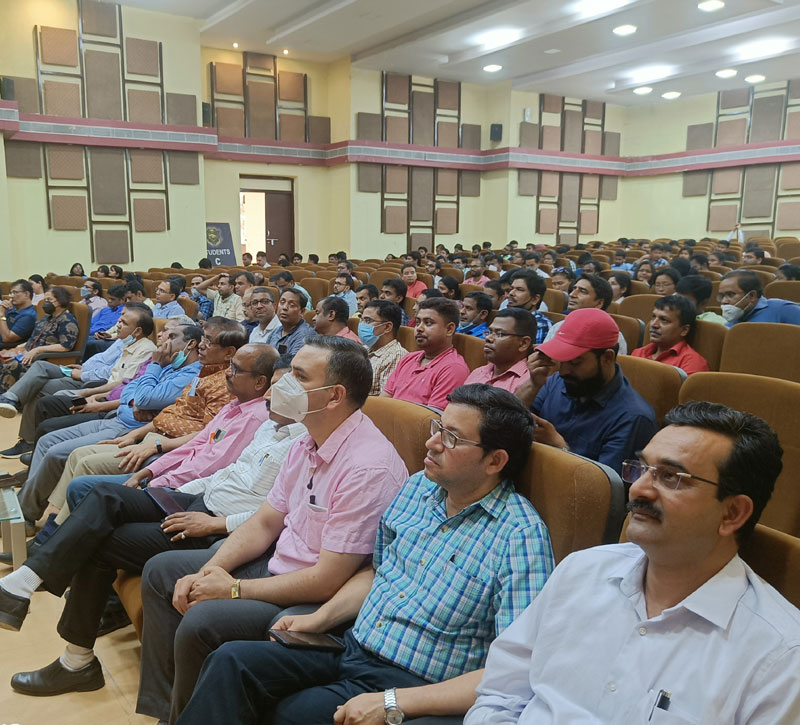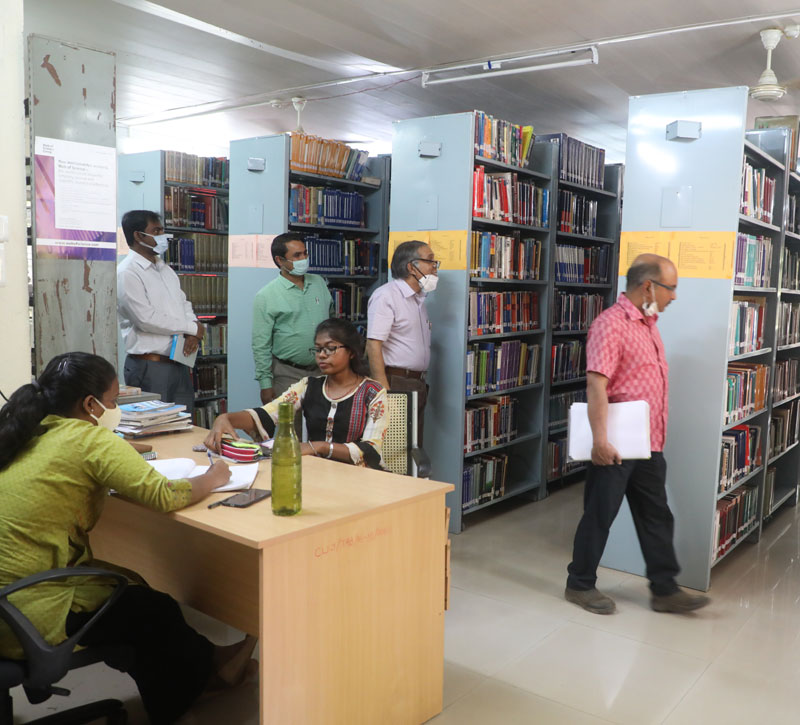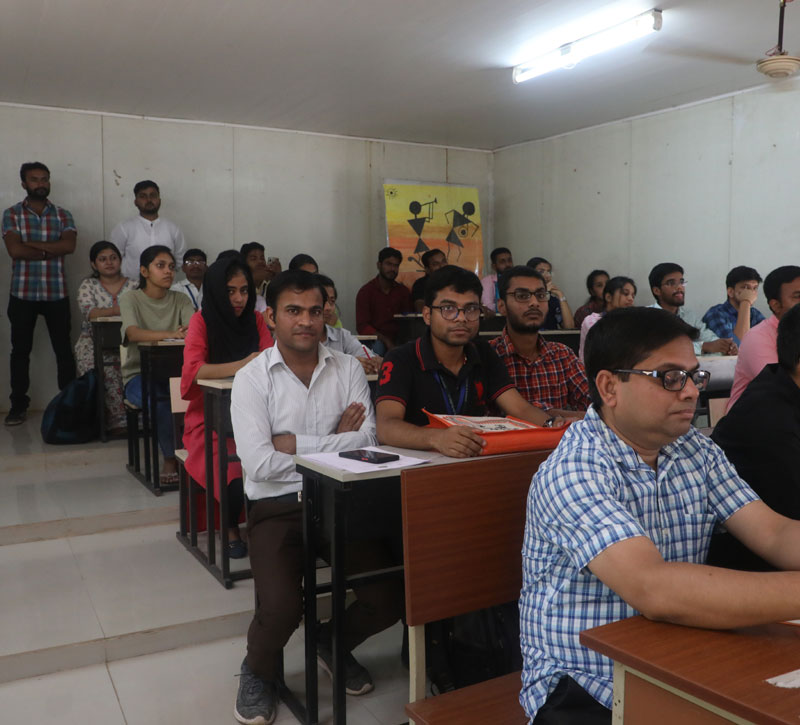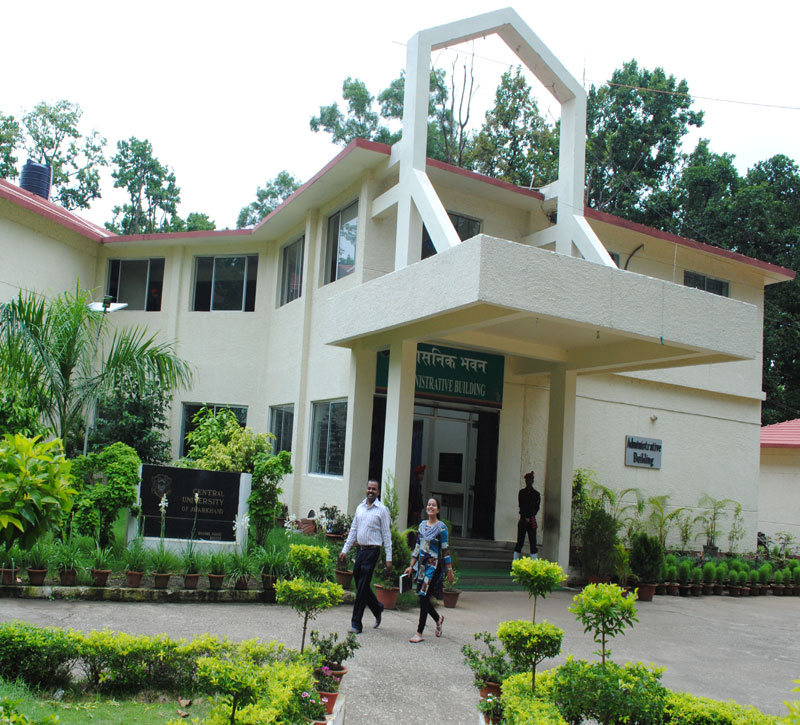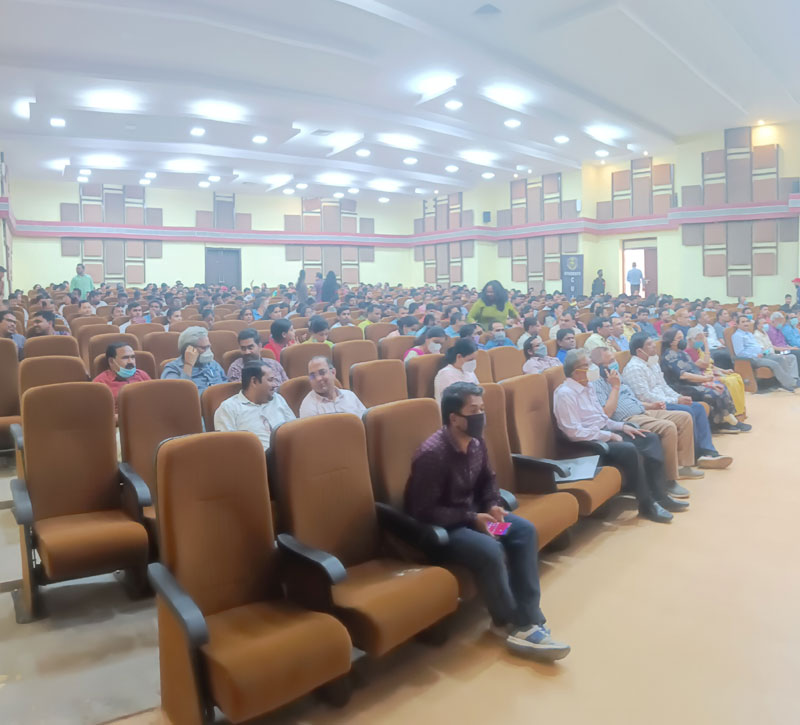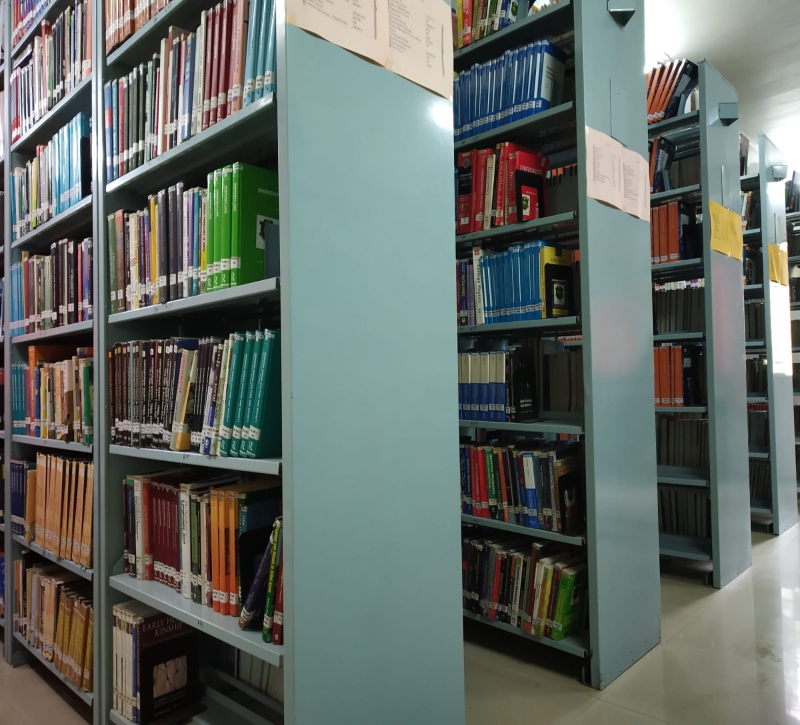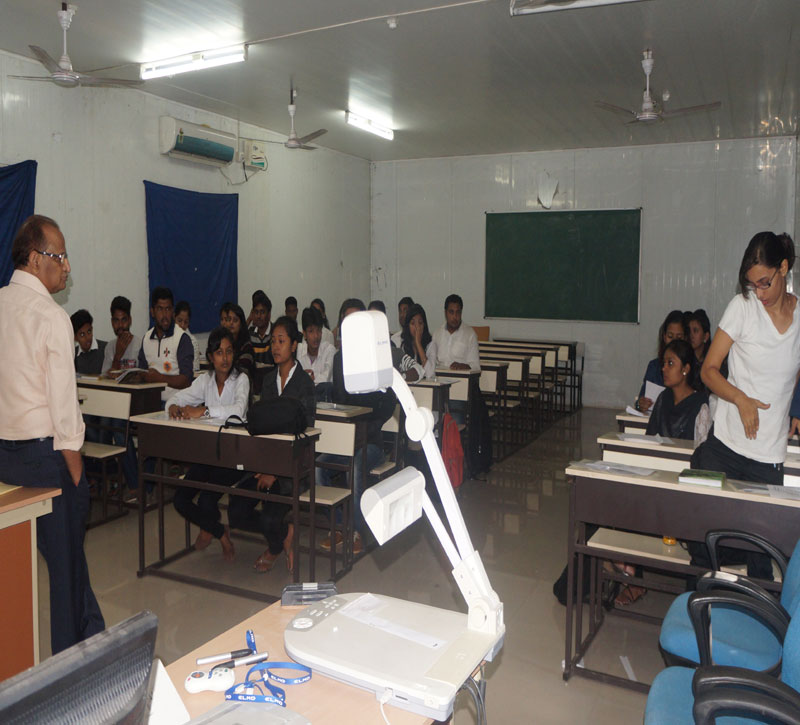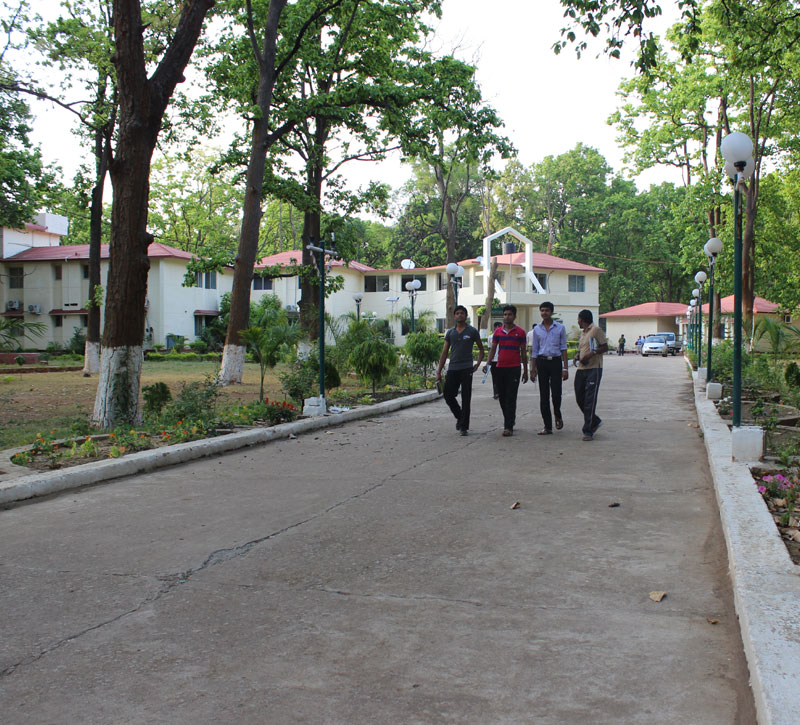INTERNAL QUALITY ASSURANCE CELL (IQAC)
Quick Links
INTERNAL QUALITY ASSURANCE CELL (IQAC)
- Home
- Members
- Calender
- Activities
- Feedback/ Survey
- Innovation
- Academic Audit Report
- CUJ Alumni
- Lecture Series
- Minutes of meeting
IQAC is an autonomous body established to monitor/ ensure/ implement quality education/ research and enhance the overall governance/ performance of the CUJ. It periodically evaluates and comes up with/advises the best possible changes to impart high-quality education for the benefit of its students and to make them stand upright with national integrity feeling and global competitiveness. Besides the all-round development of CUJ and imparting quality education, the IQAC vision is on fulfilling society’s ethical and moral responsibilities.
The IQAC in CUJ is meant for Quality Assurance of the institution and for seeking NAAC/ international accreditation. Current IQAC tasks include Continuous Improvement (areas of teaching, research, infrastructure, and administration), compliance (ensuring compliance with regulatory requirements and standards), Data collection/ analysis(academic and administrative activities), benchmarking (improving by comparing CUJ-performance with peer institutions), feedback and stakeholder engagement (feedback from students, faculty, staff, and other stakeholders to improve), and strategic planning to meet quality enhancement goals. Besides this, the professional development of faculty and staff (promoting teaching, research, and administrative capabilities), resource allocation/ optimization for the maximum benefit of the institution, transparency and accountability (in decision-making processes and holding all stakeholders responsible for their quality enhancement roles), documentation and reporting (keep records for regulatory bodies, accreditation agencies, and university management),innovations in teaching and learning (to enhance the educational experience for students). IQAC-CUJ is committed to upholding academic standards, meet regulatory requirements, and continuously strive for excellence in education and research.
As per National Assessemnt and Accreditation Council (NAAC) (www.naac.gov.in) following is the Startegies, Functions and Benefits of Internal Quality Assurance Cell (IQAC)
The IQAC ensures efficient execution of tasks, maintains academic quality, and fosters equitable access to education. It optimizes teaching methodologies and evaluation procedures, ensuring support services' adequacy and functionality. Additionally, it promotes research collaboration nationally and internationally, aiming for institutional effectiveness and academic advancement.
The Internal Quality Assurance Cell (IQAC) oversees the establishment and application of quality benchmarks for academic and administrative activities. It fosters a learner-centric environment and facilitates faculty development for effective teaching. The IQAC gathers feedback from stakeholders and disseminates information on quality parameters. It organizes workshops, documents quality improvement efforts, and coordinates best practices adoption. Maintaining an institutional database, it cultivates a quality culture and prepares the Annual Quality Assurance Report (AQAR) for NAAC submission.
The Internal Quality Assurance Cell (IQAC) aims to elevate institutional functioning by prioritizing clarity, focus, and quality enhancement. It promotes the internalization of a quality culture, fostering coordination among various activities, and institutionalizing best practices. Through providing a solid foundation for decision-making, the IQAC ensures continuous improvement in institutional functioning. It operates as a dynamic system facilitating quality changes in Higher Education Institutions (HEIs), while also establishing organized documentation and internal communication methodologies to support these endeavors.
Following is the composition of IQAC:
- * Chairperson: Head of the Institution
- * A few senior administrative officers
- * Three to eight teachers
- * One member from the Management
- * One/two nominees from local society, Students and Alumni
- * One/two nominees from Employers /Industrialists/stakeholders
- * One of the senior teachers as the coordinator/Director of the IQAC
The Central University of Jharkhand Internal Quality Assurance Cell (IQAC) was established on 15 December 2014 (vide Notification Ref. No. CUJ/ IQAC/ 2014/ 08). It aimed to promote overall quality enhancement of the University’s functioning, at par with the ever-changing academic landscape in India and the world. As the years passed, the IQAC progressed, maintaining the quality aspects fulfilling the academic, administrative, financial, and social responsibilities of CUJ governance. The current IQAC emphasizes enlightening teaching-learning/ evaluation and research/ extension activities. Since quality enhancement is a continuous process, the IQAC members often meet to assess the quality enhancement of the University, as per the NAAC (National Assessment and Accreditation Council) suggested criteria. The quality of different programs is ensured through constant quality monitoring by these means:
- * Self-appraisal reports submitted by teachers every year
- * Students’ feedback on various academic programs
- * Evaluation of teachers by students at the end of every semester
- * Academic quality assurance of faculty induction
- * The faculty sensitization programs to improve the quality of education
- * Working out intervention strategies to enhance overall quality in the institution
Director,IQAC

Prof. Ratan K. Dey
+91-8917570944
director.iqac@cuj.ac.in
Chairperson

Prof. Kshiti Bhusan Das
Vice-Chancellor,CUJ Chairman
- Teachers to represent All Level
- Prof Sarang Medhekar (DoP)
- Prof Vimal Kishore (DoE)
- Prof Subhash C Yadav (DCSE)
- Dr Sashi Singh (DoE)
- Dr Ashis Kr Senapati (DEDS)
- Dr Rajakishore Mishra (DLS)
- Dr Hena Firdaus (DLS)
- Dr Nitish Bhatia (DBA)
- Dr Konchok Tashi (DFEL-T)
- Dr Dali Ramu Burada (DoP)
- One Member from the Management
- Prof Arun K Padhy (E.C.Member)
- Few Senior Administrative Officers
- Sh K. Koshala Rao (Registrar)
- Prof Vimal Kishore (Finance Officer I/C)
- Sh BB Mishra (Controller of Examination)
- Dr Sujit K Pandey (Librarian)
- Prof Manoj Kumar (Dean Academic Affairs)
- One Senior Teacher AS Coordinator/ Director of the IQAC
- Professor Ratan K Dey (DoC,Director,IQAC)
Chairperson

Prof. Kshiti Bhusan Das
Vice-Chancellor,CUJ Chairman
- Teachers to represent All Level (Three to eight)
- Prof. Dev Vrat Singh, Professor , DMC - Member
- Dr. Vimal Kishor, Dean , School of Education - Member
- Dr. Gajendra Prasad Singh, Head, DNST - Member
- Dr. Mayank Ranjan, Assoc. Prof., DES - Member
- Dr. Nagapavan Chintalappati, Asst. Prof., DBA - Member
- Dr. Sanhita Sucharita, Asst. Prof., DBA - Member
- Dr. Rajashree Padhi, Asst. Prof., DPIR - Member
- Dr. Ajay Pratap Yadav, Asst. Prof., DCFS - Member
- One Member from the Management
- Prof. H P Singh, Dean, School of Engg. and Tech. - Member
- Few senior administrative officers
- Prof. Sarang Medhekar, Dean, R&D - Member
- Prof. Manoj Kumar, Dean,Academic Affairs - Member
- Sri Prabhudev Kurle, CoE - Member
- Dr. Sujit Kumar Pandey, Librarian - Member
- Sri Prabhudev Kurle, COE - Member
- One nominee each from local society, Students and Alumni
- One nominee each from Employers /Industrialists/ Stakeholders
- One of the senior teachers as the coordinator/Director of the IQAC
- Prof. Ratan Kumar Dey, Director, IQAC - Member Secretary
-
Vacant
-
Vacant
The list of IQAC events and the dates. These events took place to achieve the quality goals of CUJ. The programs are meant to promote the development of students, faculties, staff and the local community.
IQAC CALENDAR (2023-24)
IQAC CALENDAR (2022-23)
IQAC CALENDAR (2021-22)
IQAC CALENDAR (2020-21)
IQAC CALENDAR (2019-20)
IQAC CALENDAR (2018-19)
Feedback/ Survey
Feedback is the BEST measure of the success of any activity. The impartial feedback was collected by IQAC and used to learn and grow. The feedback from students, teachers, staff, parents and management was analyzed objectively, identifying the crucial points, themes, and effectiveness of the education provided. Based on these suggestions, steps/measures were taken to serve better.
| Stakeholder | Tabulation of received feedback and analysis | Graphs/ Statistics |
|---|---|---|
| Student’s | Student’s Feedback Link | Student’s Statistics {Link} |
| Teacher’s | Teacher’s Feedback Link | Teacher’s Statistics {Link} |
| Parent’s | Parent’s Feedback Link | Parent’s Statistics {Link} |
| Alumni | Alumni Feedback Link | Alumni Statistics {Link} |
| Employer | Employer Feedback Link | Employer Statistics {Link} |
| ONLINE FORMS | ||
| Student’s | Student’s Form | Student’s Form {Link} |
| Teacher’s | Teacher’s Form | Teacher’s Form {Link} |
| Parent’s | Parent’s Form | Parent’s Form {Link} |
| Alumni | Alumni Form | Alumni Form {Link} |
| Employer | Employer Form | Employer Form {Link} |
Innovation
CUJ Incubation Centre is in its infancy and has adapted the strategy to meet various needs. This incubation centre functions as a semi-autonomous unit within the University. New ventures are developed strategically using existing resources, workforce, internal (teacher) expertise, infrastructure/ networks, and funding/capital.
BOOSTING INNOVATION AT CUJ
INCUBATION CENTER
CIF AT CUJ
CUJ Alumni
Bylaws and regulations of “Central University of Jharkhand Alumni Association (CUJAA)” As per (Statute 35(1) (2) (3) of the Central University Act 2009) was established. The Alumni members provide valuable suggestions and constantly support various initiatives by CUJ.
Chairperson CUJAA: Professor KB Das (Hon'ble VC CUJ)
Deputy Chairperson CUJAA: Sh Koshala Rao (Registrar CUJ)
President-CUJAA: Prof. Manoj Kumar, (DEVS)
Secretary-CUJAA: Prof. Manoj Kumar, (DLS)
Treasurer-CUJAA: Prof. Ashish Sachan, (DLS)
Chief Coordinator, Alumni Cell: Dr Bhasker Singh, (EVS)
Joint Secretary-CUJAA: Ms. Stuti & Mr. Abhyuday Anurag
Members-CUJAA (Dr. Seema Mamta Minz, Dr. C.S. Dwivedi, & Dr. Ramesh Oraon)
All Departmental Alumni Representatives
OVERVIEW OF ALUMNI ACTIVITIES
FIRST ALUNMI MEET (22/ 09/ 2022)
REGISTRATION FOR MEMBERSHIP
POLICIES OF CUJ
- Anti-ragging Policy----------UGC Regulations
- Admission/ Reservation Policy
- Energy Conservation Policy
- Green Campus and Environment Policy
- Infrastructure Maintenance Policy
- IT Policy
- Equity Policy Gazette Notification
- Prevention, prohibition and redressal of Sexual harassment of women at workplace Policy
- IPR Policy
- Policy for Seed Money
- R & D Policy
- Research Ethics Policy
- Institutional Development Plan(IDP)
- Consultancy Policy
- Waste/ e-waste Management Policy
- Training and Placement Policy
- INNOVATION INCUBATION AND ENTREPRENEURSHIP POLICY
The Internal Quality Assurance Cell of CUJ initiate and constantly monitors the execution of different plans and supervises various activities that are necessary to increase the quality of the education imparted. The following activities are arranged to achieve these ambitious goals for making CUJ a quality education Hub.
IQAC CALENDAR EVENTS (2022-23)
IQAC CALENDAR EVENTS (2021-22)
IQAC CALENDAR EVENTS (2020-21)
IQAC CALENDAR EVENTS (2019-20)
IQAC CALENDAR EVENTS (2018-19)
The periodic accreditation is a voluntary peer review to assure quality improvement in the organizational structure and function. As per the previous (2019) NAAC recommendations (activities 2013-18), CUJ has worked more seriously and systematically on all the SWOT aspects to deliver quality education in society and is not merely to qualify for a higher grade. IQAC-CUJ do not view NAAC preparation as a mere documentation exercise for external assessment but as a self-introspection and provides the opportunity to improve institutional and infrastructure systems with team spirit, innovation and enthusiasm. The preparation process IQAC-CUJ actively involved presenting activities 2018-22, the management, faculty and staff, alumni and student bodies efficiently.
1.1.2 Percentage of Programs where syllabus revision was carried out during the last five years. Minutes of relevant Academic Council/BOS meeting Document Name of the Department Link for BOS
| S.No. | Department Name | Academic Council/BOS meeting Minutes (Link for BOS) |
|---|---|---|
| PHYSICS | 2018- -2019- -2020- -2021- -2022- -2023 | |
| CHEMISTRY | 2018- -2019- -2020- -2021- -2022- -2023 | |
| LIFE SCIENCES | 2019 --2023 | |
| MATHEMATICS | 2018- -2019- -2020- -2021- -2022- -2023 | |
| STATISTICS | -2022- | |
| GEOINFORMATICS | -----Link----- | |
| ENVIRONMENTAL SCIENCES | -----Link----- | |
| GEOGRAPHY | 2018- -2019- -2020- -2021- -2022- -2023 | |
| PERFORMING ARTS | -2016- 2019- -2020- -2021- | |
| ANTHROPOLOGY AND TRIBAL STUDIES | 2019- -2020- -2021- -2022- -2023 | |
| EDUCATION | 2018(I)- -2018(II)- -2020- -2021- -2023 | |
| ENGLISH STUDIES | -----Link----- | |
| FAR EAST LANGUAGES | -----Link----- | |
| HINDI | -----Link----- | |
| MASS COMMUNICATION | -----Link----- | |
| BUSINESS ADMINISTRATION | -----Link----- | |
| COMMERCE & FINANCIAL STUDIES | 2020- -2021- -2022- -2023 | |
| METALLURGICAL & MATERIALS ENGINEERING | 2018- -2019- -2020- -2021- -2022- -2023 | |
| CIVIL ENGINEERING | 2023 | |
| COMPUTER SCIENCE & ENGINEERING | 2018- -2019- -2021- -2023 | |
| POLITICAL SCIENCE AND PUBLIC ADMINISTRATION | 2023 | |
| ECONOMICS & DEVELOPMENT STUDIES | -----Link----- | |
| INTERNATIONAL RELATIONS | -----Link----- |
1.3.2 Number of value-added courses offered during last five years
12.1.1 Demand Ratio (Average of last five years) Data template
2.2.1: The Institution assesses the learning levels of the students and organizes special Programs for advanced learners and slow learners
- Approved Dissertation titles
- Award received by students in Conference- seminar
- Dissertation presentations
- Earn While You Learn ICT-based learning modules developed by teachers Internship Reports.
- Report and photos of field visits
- Report of Alumni Meet
- Report of Exit Interview Report of PTA meetings
- Student’s publications
- Minutes of AC meeting for Examination Pattern Result Analysis
2.2.2 Student - Full-time teacher ratio (Data for the latest completed academic year) List of Students and Faculty
2.3.3 Ratio of students to mentor for academic and other related issues Year-wise, the number of students enrolled and full-time teachers on roll
2.4.4 teachers who received awards, recognition, and fellowships at State, National, and International levels from Government/Govt. Recognized bodies’ e-copies of award letters
2.5.4: Current Manual of Examination Automation System {View Document}
2.6.2: Feedback processes of the institution Feedback from Teachers, Students, Alumni, Other Stakeholders, and Parents Analysis of Feedback Action Taken Report Surveys
2.6.3 Pass Percentage of Students List of Programmes and number of students who passed and appeared in the final year examination
2.7.1: Online student satisfaction survey regarding the teaching-learning process
3.1: Promotion of Research and Facilities Research Profile of the University Policy for Research Promotion Policy for Research Ethics
3.1.3.1: The number of teachers who received national/international fellowship / financial support from various agencies for advanced studies/research year-wise during the last five years. E-copies of the award letters of the teachers
3.1.4.1: The Number of JRFs, SRFs, Post Doctoral Fellows, Research Associates and other research fellows enrolled in the Institution year-wise during the last five years. E-letters of Research Fellows from CSIR UGC e-letters of Research Fellows of Projects
3.1.5: The Institution has the following facilities to support research: Central Instrumentation Facility (CIF)
3.3.3.1: Total number of awards/ recognitions received for research/ innovations won by institution/ teachers/ research scholars/ students year-wise during the last five years e-copies of award letters
3.4.2: The Institution provides incentives to teachers who receive state, national and international recognitions/awards e-copies of the letters of awards
3.4.7: E-content is developed by teachers. Link for Institutional LMS Link for Media Facilities
3.5 Consultancies e-copies
3.6.4 Students participating in extension activities
CUJ underwent the First Cycle of the accreditation process by the National Assessment and Accreditation Council (NAAC) in 2019 based on the University’s activity during (2013-2018). These were based on the NAAC-endorsed intricate framework of seven criteria presented in the assessment. This information is available online:
| Criterion | EVALUATION ASPECT | Link |
|---|---|---|
| Measure | Curricular aspects | SSR 2019 |
| Measure | Teaching learning and evaluation | SSR 2019 |
| Measure | Research, consultancy, and extension | SSR 2019 |
| Measure | Infrastructure and learning resources | SSR 2019 |
| Measure | Student support and progression | SSR 2019 |
| Measure | Governance, leadership, and management | SSR 2019 |
| Measure | Innovations and best practices | SSR 2019 |
The Self-Study Report (SSR) was carefully prepared and submitted for the NAAC accreditation process. The SSR report of CUJ reflects the self-evaluation that involves the participation of all the stakeholders – students, faculty members, parents, administrative staff, management, employers, local community and CUJ alums. The CUJ IQAC has put all 2.1.2-letter_issued_State govt efforts into accumulating information on different aspects of educational services and gathering the credibility of all stakeholders to facilitate the developmental journey. This is meant not only for the NAAC accreditation but also to catalyze self-improvement, promoting innovation, strengthening to excel and imparting the best education.
(2017-2022; Submitted on **/**/2023/24) {PDF-LINK}
NAAC SAR (Aug 2021 to July 2022)
NAAC SAR (Aug 2020 to July 2021)
NAAC SAR (Aug 2019 to July 2020)
NAAC SAR (Aug 2018 to July 2019)
NAAC SAR (Aug 2017 to July 2018)
Webinar Report :
Internal Quality Assurance Cell of Central University of Jharkhand organized an online webinar on Indian Constitution on 26th November 2021 in online mode. The webinar is chaired by Prof K B Das, the Honorable Vice Chancellor of CUJ. The programme is inaugurated by Prof R K Dey, Director IQAC while welcoming the speakers, Professor Manoj Kumar Mishra from Banaras Hindu University and Dr D Anand from Department of Political Science, IGNOU-New Delhi. The speakers deliberated the importance of the Constitution in nation building and socio- economic condition of Indian society. All the dignitaries urged the students community to adhere to their duties and responsibilities in stead of being more right oriented. The webinar was concluded with a vote of thanks by the seminar organizer.
Webinar Report :
A seminar on National Education Policy (NEP) 2020 was organised at the Central University of Jharkhand on Saturday. Amit Khare, the advisor to the government of India, was the chief guest of this event where he highlighted the importance of National Education Policy. He said that this policy is very important towards building a knowledge based society which establishes a synergy between the global scenario and the Indian knowledge tradition. He further said that its objective is to promote basic knowledge. Great emphasis has been laid on education in Indian languages for this reason. According to him, this education policy will bring a comprehensive change in the Indian education system in future through a multidisciplinary education system, internationalization of education, vocational and technology based education and research based knowledge. He emphasized that with the advent of this policy, its implementation is of paramount importance. Many neighboring countries are seeing India as a hub in the field of education. He said that the role of the Central University of Jharkhand is also important because other educational institutions of the state look at it as a mentor. On this occasion, the Vice Chancellor of Jharkhand University, Prof. Kshiti Bhushan Das while welcoming the chief guest said that CUJ has made many such efforts in the field of education and research, whose far-reaching results will be seen in the coming times. He said that this university is in the next stage of development which has some challenges. Everyone's cooperation is necessary to solve this. On this occasion, Prof. Ratan Kumar Dey who is the Director of IQAC, presented a report related to the education and research of the university. He said that many steps have been taken in the context of the National Education Policy. Referring to various committees, he said that they are related to the National Education Policy and are working on various qualitative aspects, whose implementation will be seen soon. At the end of the event, the registrar of CUJ, Prof SL Harikumar, gave the vote of thanks. All the Deans, heads, teachers and staff of the university were present during this event.




